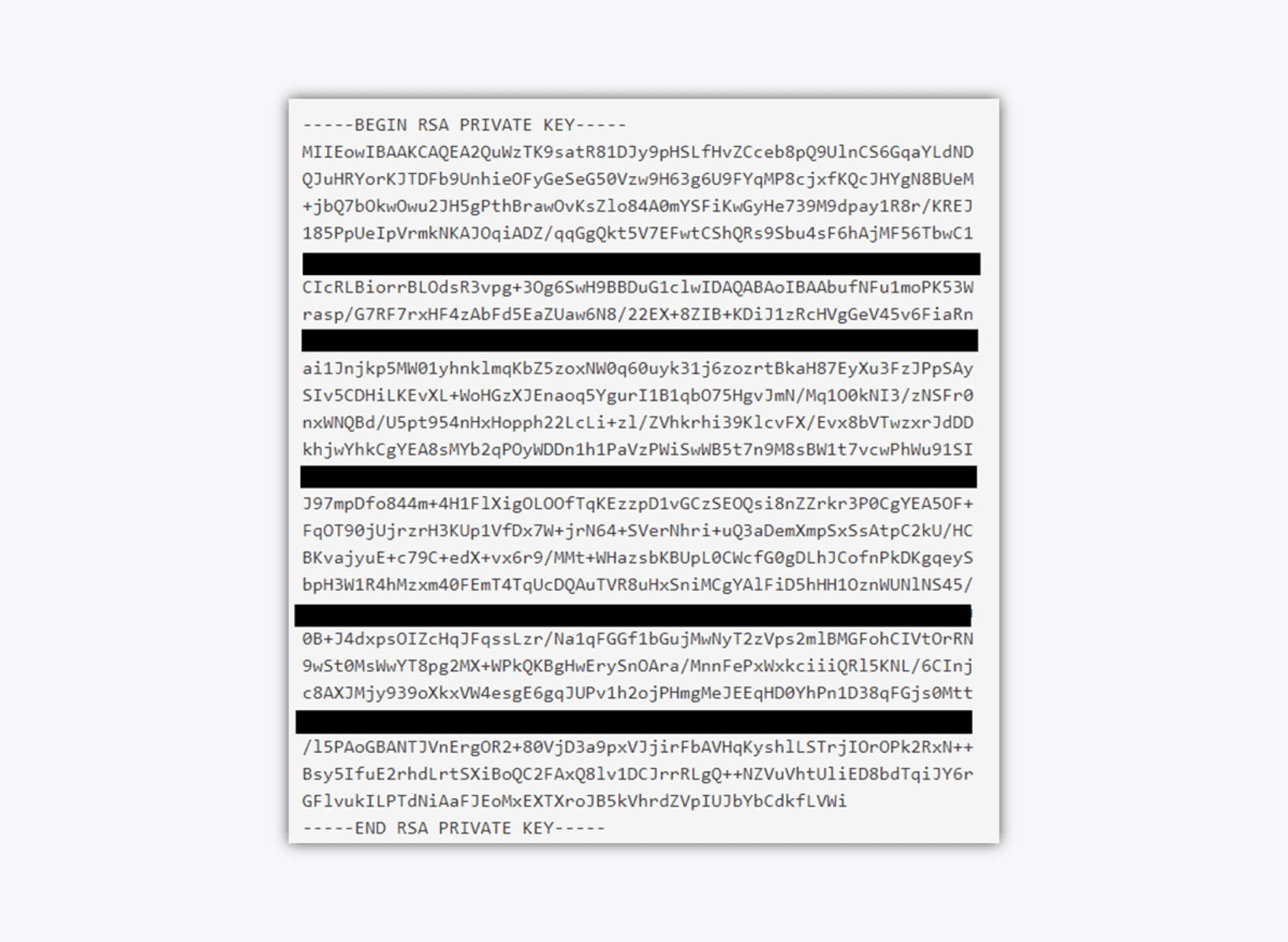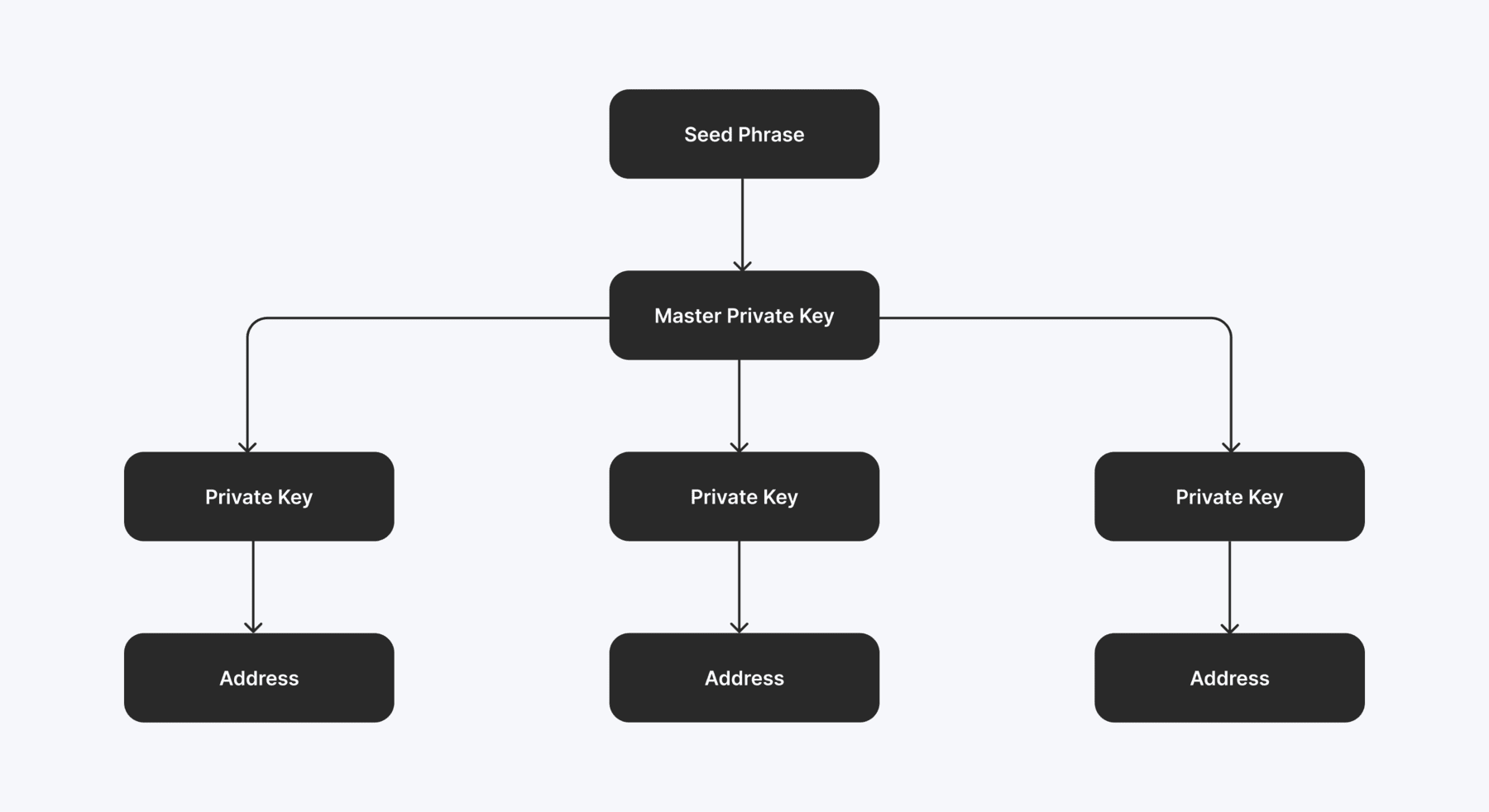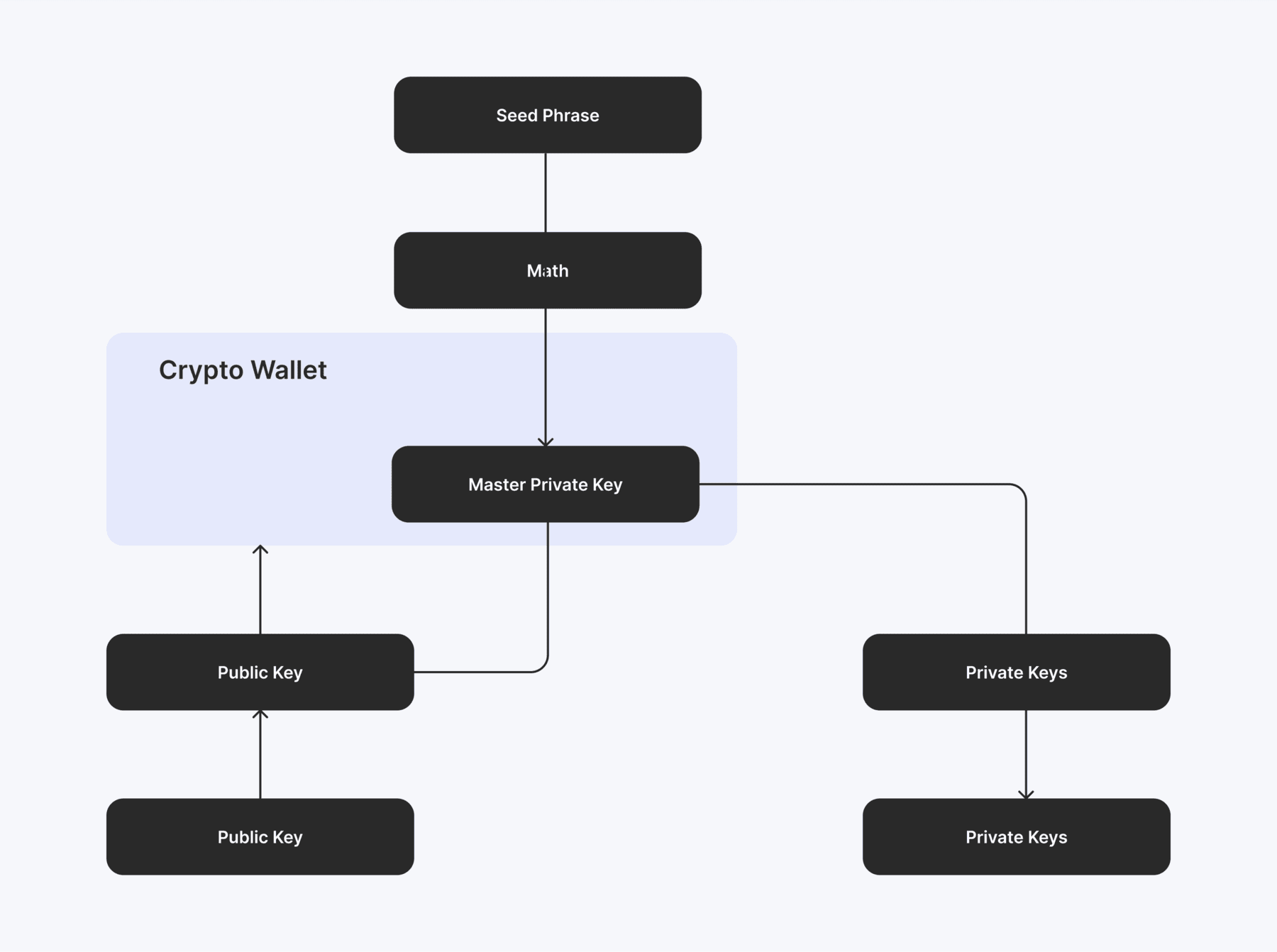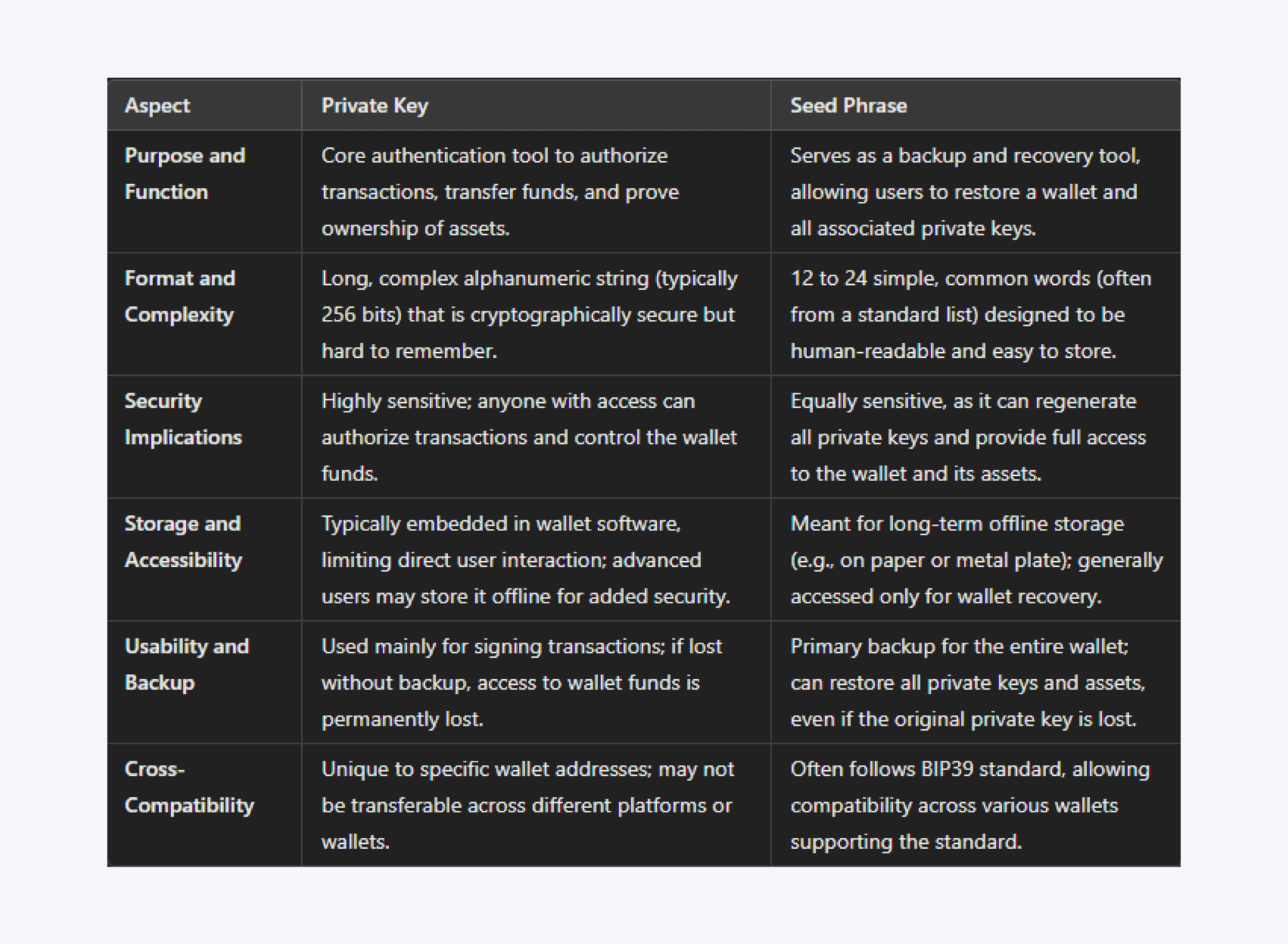As someone who has been involved in the world of cryptocurrencies for quite some time now, I can confidently say that understanding the differences between private keys and seed phrases is crucial to maintaining the security and integrity of your digital assets.
Picture your cryptocurrency wallet as a secure digital safe where you store valuable assets in the form of coins and tokens. This safe can only be accessed with a unique, personal key that gives you complete authority over its contents. However, just like any valuable item, there’s always a chance of losing or having it stolen.
In tough situations, it’s crucial to have a dependable contingency plan. This ensures that you can still recover your assets, even in the event of a catastrophe. You can achieve this through the use of secret codes and recovery phrases, which serve as a foundation for cryptocurrency safety.
This article will explain the differences between private keys vs seed phrase.
Key Takeaways
- Secret encryption keys and seed phrases are two must-have items of crypto wallet operation.
- A private key controls your crypto tools, while a seed phrase serves as a recovery method for your wallet.
- Although both offer security, they do so in distinctly different ways.
What Is a Private Key?
In simpler terms, a private key serves as an essential piece of information within digital applications and cryptocurrencies. It’s a lengthy, distinct, randomly generated combination of numbers and letters that operates like a password for a digital purse or wallet. In essence, this private key is the exclusive means to access, handle, and regulate the money stored in your wallet.

In the context of cryptocurrency exchanges, the private key plays a crucial role in approving transfers and confirming ownership of digital possessions. This key is linked with a public key, which is generated from it, and acts as your wallet’s address that others can utilize to deposit funds. Importantly, only the private key has the power to access and facilitate transactions involving those assets.

The private key is designed to be kept entirely confidential. Unlike a traditional password or PIN, which can often be reset if forgotten, a private key cannot be recovered or replaced if it’s lost. If someone loses access to their private key, they lose ownership of the funds associated with that key, making it unrecoverable.
Losing these keys permanently underscores the need for meticulous care when managing them, because if they’re mislaid, you’ll no longer have authority over the resources linked to them.
Conversely, should a private key fall into the wrong hands or be stolen, the person holding that key will have unrestricted control over the wallet, enabling them to transfer or expend the assets without encountering any obstacles.
For numerous users, wallet interfaces and hardware devices have made it easier to manage private keys when it comes to owning cryptocurrencies. This means that users can possess digital currencies without needing to handle or view their private keys personally.
As an analyst, I’d articulate it this way: For those who are more tech-savvy, they occasionally opt for the self-management of their private keys. This is typically done by keeping these sensitive details offline in highly secure locations or employing additional safety measures like hardware wallets, which serve as a backup solution.
In crucial situations, many digital wallets use encryption methods and authentication processes to safeguard the confidentiality of user keys. However, it’s essential for users themselves to ensure their keys remain secure against unauthorized intrusion.
Fast Fact
A seed phrase serves as the ultimate backup for your cryptocurrency wallet since it can recreate the entire wallet, along with all its secret keys, on any device that is compatible – effectively restoring your digital assets.
What is a Seed Phrase?
A seed phrase represents an essential aspect in the realm of cryptocurrency and blockchain technology, functioning as an accessible method for both backing up and recovering access to your digital wallet. It may also be known as a recovery pattern or mnemonic sequence. This sequence usually consists of 12 to 24 easy-to-remember words that are randomly generated.

These words are chosen from a particular list employed by digital wallet programs for generating and re-creating unique private keys that allow access to funds. The straightforwardness of these ordinary terms makes them simpler to recall or save compared to complex private keys, making seed phrases a user-friendly and efficient backup option.
The seed phrase serves as a crucial foundation since it enables users to restore their digital wallet on any suitable device, regardless of whether the initial wallet gets misplaced, broken, or hacked. Safeguarding this seed phrase ensures that an entirely new wallet can be created, complete with all connected private keys and assets.
This makes it invaluable for cryptocurrency users who need a reliable recovery method. However, a seed phrase like a private key must be strictly confidential.
Possessing a seed phrase gives an individual full control over the digital wallet and its contents, similar to having direct access to the associated private key.

As a seasoned crypto investor, I always make it a point to safeguard my digital assets using seed phrases that are universally recognized within the industry. These phrases, often based on BIP39 (Bitcoin Improvement Proposal 39), ensure my recovery words can be understood across various wallets and platforms, thereby maintaining both compatibility and security in my investments.
Cross-compatibility ensures that users have the freedom to switch between various wallet providers, allowing them to recover their wallets on other compatible platforms should the need arise.
Consequently, it’s important to note that the burden of safely keeping the seed phrase is entirely on the user, since wallet services usually don’t have the ability to retrieve a misplaced one.
Key Differences Between Private Keys vs Seed Phrase
While both private keys and seed phrases serve crucial roles in securing your wallet’s assets, it’s essential to understand that their functions and primary purposes vary somewhat. Specifically, here are some key distinctions:
Purpose and Function
The private key is the core authentication mechanism for managing crypto assets. Each private key is integrated with a special public key, forming a cryptographic pair that allows users to access and control their funds securely. The private key lets users authorize transactions, transfer funds, and prove ownership by signing transactions cryptographically.
After a transaction is sealed using a private key, it gets sent out to the blockchain for confirmation and recording. In this manner, crucial tasks such as secure digital authentication codes – unique to each wallet – ensure that only the account holder can access their assets.
Instead of being used for regular transactions, the seed phrase functions primarily as a means for backup and restoration of your digital wallet. When you first set up your wallet, it automatically creates a seed phrase which acts as the foundation for all private keys housed within that specific wallet.
Essentially, the seed phrase serves as an essential “backup” for your digital wallet. In case your wallet gets misplaced or broken, you can utilize this seed phrase to restore the wallet and recover all its linked private keys.
As a crypto investor, I understand that the seed phrase isn’t involved in day-to-day transactions or transfers. Instead, it serves as an essential safety measure, kept securely for emergencies. If, heaven forbid, I lose my wallet, this seed phrase becomes my lifeline, enabling me to regain access on any compatible platform.
Format and Complexity
A private key is a long, complex alphanumeric string, typically 256 bits long, ensuring high levels of cryptographic security. This complexity is vital because it makes it extremely difficult for hackers to guess or brute-force the key.
From my perspective as an analyst, I find that due to their length and unpredictability, private keys aren’t designed for human comprehension or easy recall. In fact, it’s practically impossible for users to store these keys in their memory. To mitigate the risk of user error or accidental exposure, these private keys are typically integrated within wallet software and managed by the wallet interface itself. This approach helps ensure a higher level of security and reduces potential mistakes.
Instead of using technical terms, let me rephrase it for you: A seed phrase is created to be easily understood and memorable by humans. It’s made up of 12 to 24 common words that can come from a predefined list (like the BIP39 list with 2048 words). This seed phrase allows users to securely store their wallet information in a more practical way.
Due to its common vocabulary, the seed phrase is much simpler to record, keep safely offline, and access when needed. This structure makes it more secure and user-friendly for management purposes. It converts the phrase into the necessary cryptographic data to regenerate private keys through a process, maintaining strong security standards.
Security Implications
In a wallet, the private key holds the utmost importance because it provides unrestricted power to manage all transactions. Anyone who gets hold of the private key can authorize transactions without the owner’s approval, which could result in draining the wallet. Consequently, the private key is concealed by the user-friendly interface in most wallets to ensure maximum security.
It’s strongly recommended that users keep their private keys away from digital formats, especially in cloud storage and online devices, because they are vulnerable to hacking, malware, and phishing attempts. A more secure alternative is using hardware wallets, which enable offline storage of private keys to reduce potential risks.
Even though a seed phrase doesn’t take part in executing transactions on its own, it has the power to restore all the private keys linked to your digital wallet. This means that having the seed phrase grants you full control over the wallet and all its contained assets, making it just as important and sensitive as the wallet itself.
Instead of individual private keys that are used for certain transactions, a seed phrase is typically kept on hand and brought out during instances where it’s needed for restoring your digital wallet.
Since it offers complete access, it’s crucial to keep it safely stored offline, ensuring it is guarded against both theft and potential harm from elements such as fire or water.
Storage and Accessibility
Wallet software often contains your private keys, meaning you can access them only when approved transactions occur. This setup decreases the necessity for users to handle private keys directly, lowering the possibility of unintentional disclosure.
Certain tech-savvy individuals might choose to safeguard their private keys outside the digital realm, such as on physical documents or hardware wallets, for an additional protection measure. For those seeking ultimate control, these keys can be stored on offline devices that have never been connected to the internet. However, this method necessitates a high level of expertise and care in handling.
The seed phrase serves a crucial purpose: it’s designed for secure, long-term preservation, particularly during the process of setting up or reactivating a digital wallet. Given that it is used sparingly, only when establishing or reviving a wallet, it can be handwritten and kept offline – in a safe or vault, for instance – to ensure protection from unauthorized use.
As a researcher studying digital asset security, I often come across users taking extra measures to safeguard their seed phrases. One common practice I’ve noticed is engraving the seed phrase onto a metal plate to shield it from physical harm. However, it’s essential to emphasize that storing the seed phrase on digital devices or in cloud storage should be avoided at all costs. This approach can potentially expose your seed phrase to malware attacks or online theft, thereby compromising the security of your assets.
Usability and Backup
If a user misplaces their personal access key without having a spare, they irreversibly forfeit access to the money stored within that digital wallet. This is because it’s impossible to recreate or reset a private key once it’s lost. The primary function of a private key lies in validating transactions, and for most users, this process happens behind the scenes, as wallet software typically manages it.
Individuals who securely save their private keys by storing them offline or within encrypted digital formats have the flexibility to do so. Nevertheless, the recovery phrase often serves as the main copy, meaning that it can be regenerated if the private key is lost. In simpler terms, while users may keep their private keys in various ways, the recovery phrase typically remains crucial because it allows the restoration of the keys if they become unavailable.
The seed phrase serves as a tool for both backup and restoration purposes. It allows users to reconstruct their entire digital wallet on any suitable device or system, ensuring that all private keys are included.
Since it holds every key linked to the digital wallet, it’s essential to secure this backup, as it isn’t usually involved in routine transactions.
With a secure storage of your seed phrase, you’ll have the assurance that you can retrieve your digital wallet anytime, regardless if you misplace the initial device or software.
Cross-Compatibility
Each wallet has its own distinct private key that is exclusive to the associated address and cannot be moved between different platforms due to their unique nature. Some wallet services might employ various procedures or structures for these private keys, which may restrict their mobility across different systems.
Generally, users often handle distinct personal keys for diverse wallet addresses, which could necessitate extra applications to move funds between incompatible systems.
Instead of using different recovery phrases for each wallet, a single seed phrase that follows the BIP39 standard offers greater adaptability. This universal seed phrase is compatible with multiple wallets that adhere to this standard, ensuring users can easily transfer their funds between these wallets without worrying about losing access to them.
In situations when users aim to shift assets between different digital wallets, or recover their funds if they encounter problems with their wallet software, this compatibility proves useful.

Conclusion
It’s crucial for anyone dealing with cryptocurrencies to grasp the differences between secret keys and seed phrases, as both play essential roles in maintaining the security of your crypto assets. While they serve similar purposes in terms of access, they have distinct functions, and as more people adopt cryptocurrencies, ensuring their safekeeping becomes increasingly important.
By virtue of blockchain transactions being non-reversible, accidentally losing or exposing private keys or seed phrases could lead to substantial financial losses. To mitigate this risk, it’s essential to focus on secure storage solutions and become adept in using these tools, laying the groundwork for sound cryptocurrency management. This practice will provide users with peace of mind and enable them to safeguard their assets effectively over an extended period.
FAQ
What is a private decryption key in the crypto area?
A private key is a unique, randomly generated alphanumeric string that confers rights to and jurisdiction over crypto coins in a wallet.
What is a seed phrase?
A seed phrase, sometimes called a recuperative or recurrent word pattern, is a series of 12-24 common words used as a reassurance for a crypto wallet.
How do private keys and seed phrases differ in function?
A private key enables transaction monitoring and asset allocation, similar to a secured password. A seed pattern, however, serves as a backup and recovery tool.
Can I use my private key to recover my wallet?
No, a private key alone cannot fully recover a wallet. It only controls specific addresses within the wallet. You’ll need the seed phrase to completely restore a wallet (and all associated secure keys).
Why is a seed phrase easier to store than a private key?
A seed phrase consists of simple, everyday words, making it easier to write down, remember, and store securely.
Is it safe to store my seed phrase digitally?
It’s generally unsafe to store a seed phrase digitally, especially on internet-accessed devices, as it could be exposed to hacking or malware.
Read More
- Gaming News: Why Kingdom Come Deliverance II is Winning Hearts – A Reader’s Review
- The Weeknd Shocks Fans with Unforgettable Grammy Stage Comeback!
- Taylor Swift Denies Involvement as Legal Battle Explodes Between Blake Lively and Justin Baldoni
- The Elder Scrolls IV: Oblivion Remastered – How to Complete Canvas the Castle Quest
- Hut 8 ‘self-mining plans’ make it competitive post-halving: Benchmark
- S.T.A.L.K.E.R. 2 Major Patch 1.2 offer 1700 improvements
- Jujutsu Kaisen Reveals New Gojo and Geto Image That Will Break Your Heart Before the Movie!
- Disney Cuts Rachel Zegler’s Screentime Amid Snow White Backlash: What’s Going On?
- Shundos in Pokemon Go Explained (And Why Players Want Them)
- We Ranked All of Gilmore Girls Couples: From Worst to Best
2024-11-12 15:27